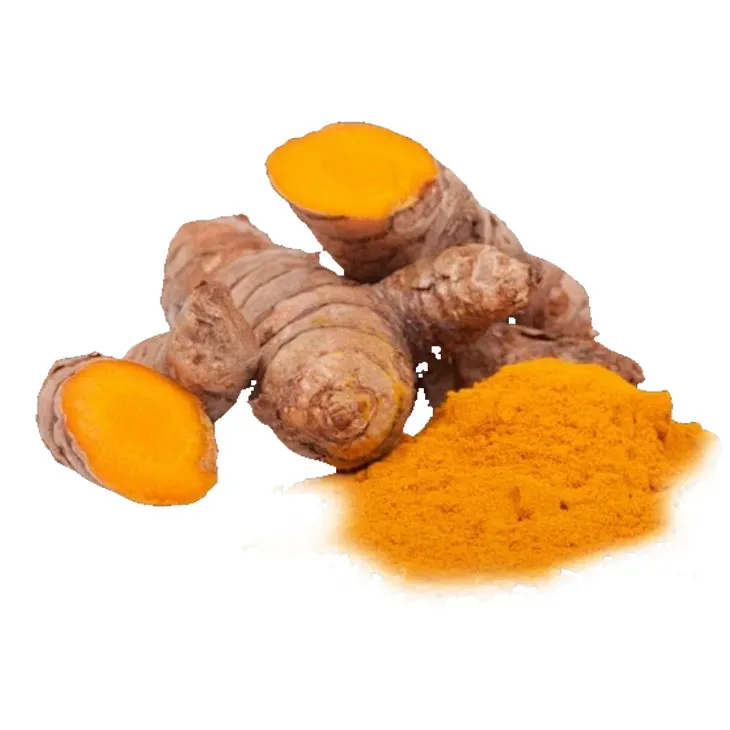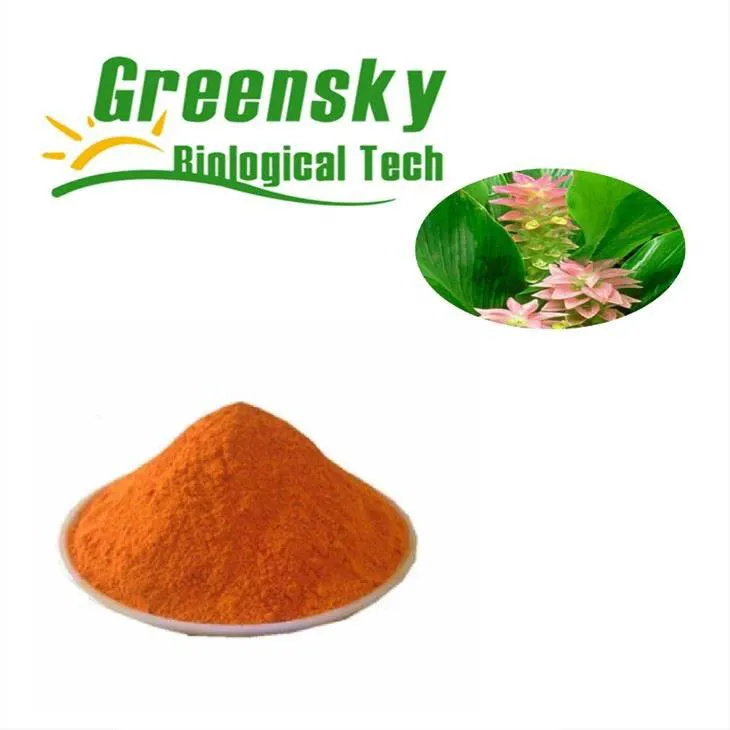- 0086-571-85302990
- sales@greenskybio.com
How does curcumin cater to health - conscious consumers?
2024-12-15

Introduction to Curcumin
Curcumin is a natural compound that has been garnering significant attention in recent years. It is derived from the turmeric plant, which has been used in traditional medicine for centuries, particularly in Asian cultures. Curcumin is responsible for the bright yellow color of turmeric and is known for its antioxidant, anti - inflammatory, and antimicrobial properties.

Health - Conscious Consumers: Their Needs and Desires
Today's health - conscious consumers are more informed and proactive about their well - being than ever before. They are constantly seeking ways to improve their health through diet, exercise, and the use of natural products. These consumers are often interested in:
- Preventing chronic diseases: Such as heart disease, diabetes, and cancer.
- Managing inflammation: Inflammation is linked to many health problems, so reducing it is a top priority.
- Enhancing skin health: A clear and healthy complexion is highly desired.
- Boosting the immune system: To better fight off infections and diseases.

How Curcumin Meets the Needs of Health - Conscious Consumers
1. Anti - Inflammatory Properties
Chronic inflammation is a root cause of many diseases. Curcumin has been shown to have powerful anti - inflammatory effects. It can inhibit the production of inflammatory molecules in the body, such as cytokines and prostaglandins. This makes it an attractive option for consumers looking to reduce inflammation and potentially prevent diseases associated with chronic inflammation, like arthritis.
2. Antioxidant Activity
Free radicals are unstable molecules that can damage cells and contribute to aging and disease. Curcumin is a potent antioxidant, which means it can neutralize free radicals. By doing so, it helps protect cells from oxidative stress, which is beneficial for overall health. Health - conscious consumers recognize the importance of antioxidants in their diet, and curcumin - rich products can be an excellent addition to their daily routine.
3. Potential Cancer - Preventing Effects
While more research is needed, some studies suggest that curcumin may have cancer - preventing properties. It may be able to interfere with the growth and spread of cancer cells in various ways, such as by inducing apoptosis (programmed cell death) in cancer cells or inhibiting angiogenesis (the formation of new blood vessels that supply tumors). For consumers worried about cancer risk, curcumin - containing products could be a part of a preventive strategy.
4. Heart Health Benefits
Curcumin may also contribute to heart health. It can help lower cholesterol levels, particularly LDL (the "bad" cholesterol). Additionally, it may improve endothelial function, which is important for maintaining healthy blood vessels. For health - conscious individuals aiming to keep their hearts in good shape, curcumin offers a natural and potentially effective option.
5. Skin Health Improvement
When it comes to skin health, curcumin has several benefits. It can help reduce inflammation in the skin, which is useful for treating conditions like acne and eczema. Moreover, its antioxidant properties can protect the skin from damage caused by UV radiation and environmental pollutants. Curcumin - based beauty products, such as creams and serums, are becoming increasingly popular among consumers who are focused on maintaining healthy and youthful - looking skin.
6. Immune System Boost
By reducing inflammation and oxidative stress, curcumin can also support the immune system. A healthy immune system is crucial for fighting off infections and diseases. Consumers who are conscious of their immune health may turn to curcumin as a natural way to give their immune system a boost.

Forms of Curcumin Available to Consumers
1. Dietary Supplements
One of the most common forms of curcumin available to consumers is in the form of dietary supplements. These can come in capsules, tablets, or powders. Dietary supplements are a convenient way for consumers to ensure they are getting a consistent dose of curcumin. However, it's important to note that the quality and bioavailability of different supplements can vary. Some supplements may be formulated with additional ingredients to enhance the absorption of curcumin, such as piperine (found in black pepper).
2. Functional Foods
Curcumin is also being incorporated into a variety of functional foods. For example, it can be added to juices, smoothies, and energy bars. This allows consumers to consume curcumin as part of their regular diet. Functional foods are an appealing option for those who prefer to get their nutrients from food sources rather than supplements. Additionally, some food products are specifically designed to target certain health benefits, such as curcumin - enhanced teas for relaxation or digestion.
3. Beauty and Skincare Products
As mentioned earlier, curcumin is finding its way into the beauty and skincare industry. It can be found in face creams, masks, and serums. These products often tout the skin - improving properties of curcumin, such as reducing inflammation, brightening the complexion, and fighting signs of aging. Consumers who are interested in natural beauty solutions are increasingly turning to curcumin - based skincare products.

Challenges and Considerations
1. Bioavailability
One of the main challenges with curcumin is its relatively low bioavailability. This means that a large portion of the curcumin consumed may not be effectively absorbed by the body. To overcome this, manufacturers are exploring different formulations, such as lipid - based or nanoparticle - based curcumin, which can improve absorption. Consumers should be aware of this issue when choosing curcumin products and look for those that have addressed the bioavailability problem.
2. Quality Control
With the increasing popularity of curcumin products, quality control is crucial. There are many different brands and sources of curcumin supplements and foods on the market. Some may not contain the claimed amount of curcumin or may be contaminated with other substances. Consumers should choose products from reputable manufacturers and look for third - party testing or certifications to ensure they are getting a high - quality product.
3. Interaction with Medications
Curcumin may interact with certain medications. For example, it can affect the way some drugs are metabolized in the liver. Consumers who are taking medications, especially those with underlying health conditions, should consult their healthcare provider before starting to use curcumin products. This is to ensure that there are no adverse interactions that could affect their health or the effectiveness of their medications.

Conclusion
Curcumin has a great deal to offer health - conscious consumers. With its wide range of potential health benefits, from anti - inflammatory and antioxidant effects to skin health and immune system support, it has become an appealing natural product. However, consumers need to be aware of the challenges associated with curcumin, such as bioavailability and quality control. By making informed choices and choosing high - quality products, health - conscious consumers can incorporate curcumin into their lifestyle and potentially reap the many benefits it has to offer.
FAQ:
Q1: What are the main health benefits of curcumin?
Curcumin has anti - inflammatory properties, which can help reduce inflammation in the body. It also has antioxidant effects, protecting cells from damage caused by free radicals. Additionally, it may contribute to better heart health, support joint health, and potentially have benefits for brain function.
Q2: How is curcumin incorporated into beauty items?
Curcumin can be added to skincare products such as creams, serums, and masks. In these beauty items, it may help improve skin complexion, reduce signs of aging like wrinkles and fine lines, and assist in treating skin conditions due to its antioxidant and anti - inflammatory qualities.
Q3: What types of food products can curcumin be added to?
Curcumin can be added to a wide range of food products. It is commonly found in curries, but also in some health - focused products like smoothies, energy bars, and even some dairy products. It gives a distinct color and flavor while adding its health - promoting properties.
Q4: Is curcumin safe for all health - conscious consumers?
Generally, curcumin is considered safe for most people when consumed in normal amounts. However, some individuals may be allergic to it. Also, those taking certain medications should consult their doctor before consuming curcumin - rich products, as it may interact with some drugs.
Q5: How can consumers ensure they are getting high - quality curcumin products?
Consumers can look for products from reputable brands. They should check for third - party testing or certifications. Reading product labels carefully to ensure a high concentration of curcumin and pure ingredients can also help. Additionally, looking for reviews and recommendations from other health - conscious consumers can be useful.
Related literature
- The Health Benefits of Curcumin: A Review of Clinical Trials"
- "Curcumin in Food and Health: A Multifunctional Ingredient"
- "The Role of Curcumin in Skincare and Beauty"
- ▶ Hesperidin
- ▶ citrus bioflavonoids
- ▶ plant extract
- ▶ lycopene
- ▶ Diosmin
- ▶ Grape seed extract
- ▶ Sea buckthorn Juice Powder
- ▶ Beetroot powder
- ▶ Hops Extract
- ▶ Artichoke Extract
- ▶ Reishi mushroom extract
- ▶ Astaxanthin
- ▶ Green Tea Extract
- ▶ Curcumin Extract
- ▶ Horse Chestnut Extract
- ▶ Other Problems
- ▶ Boswellia Serrata Extract
- ▶ Resveratrol Extract
- ▶ Marigold Extract
- ▶ Grape Leaf Extract
- ▶ blog3
- ▶ blog4
- ▶ blog5
-
Pure 85% Tomentil Extract.
2024-12-15
-
Kelp Extract Powder
2024-12-15
-
White mustard seed extract
2024-12-15
-
Andrographis Paniculata Extract Powder
2024-12-15
-
Rose Hip Extract
2024-12-15
-
Pomegranate Extract
2024-12-15
-
Cat Claw Extract
2024-12-15
-
Hedyotis Diffusa Extract
2024-12-15
-
Gynostemma pentaphyllum extract
2024-12-15
-
Saffron Extract Powder
2024-12-15
-
Reishi mushroom extract
2024-12-15





















